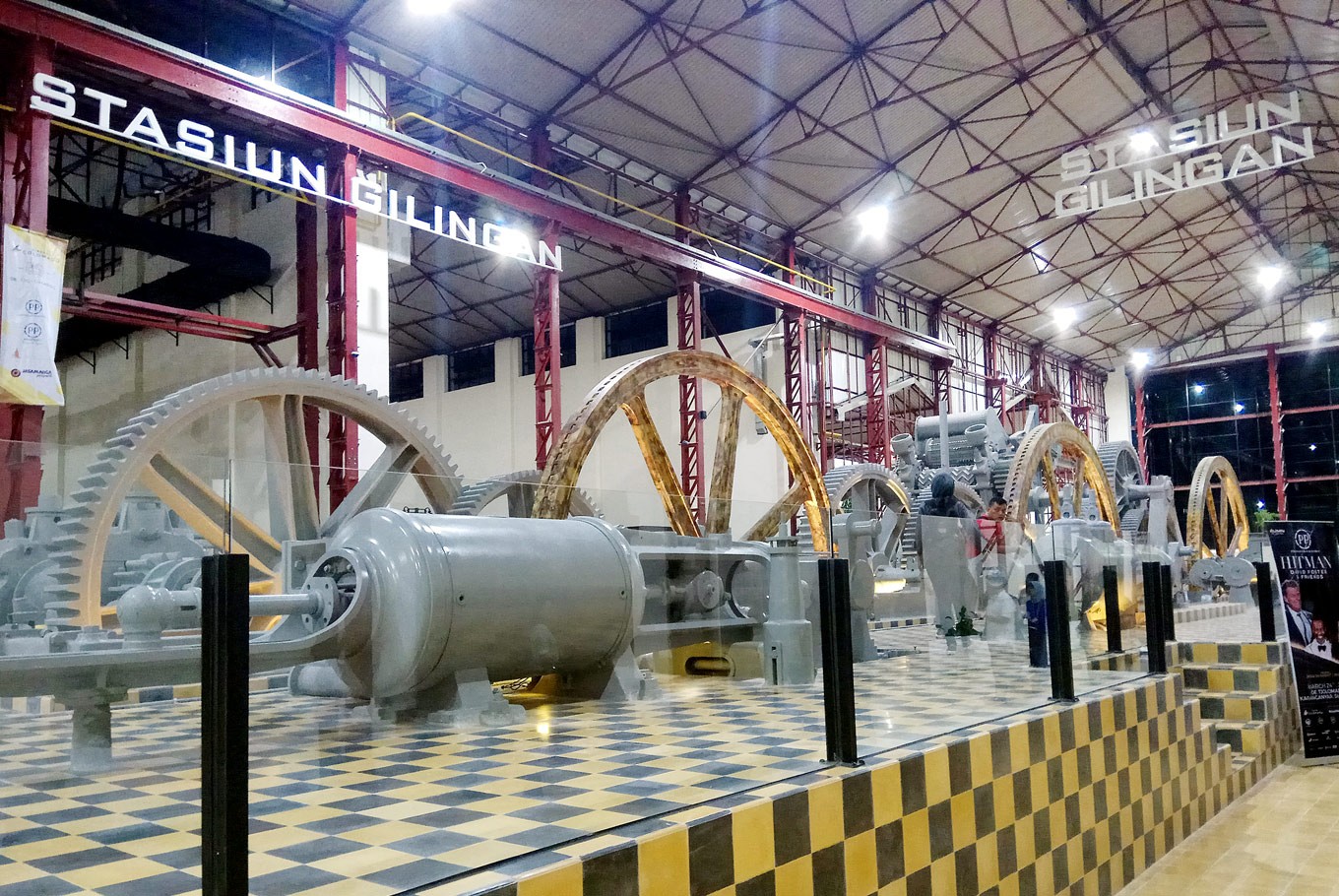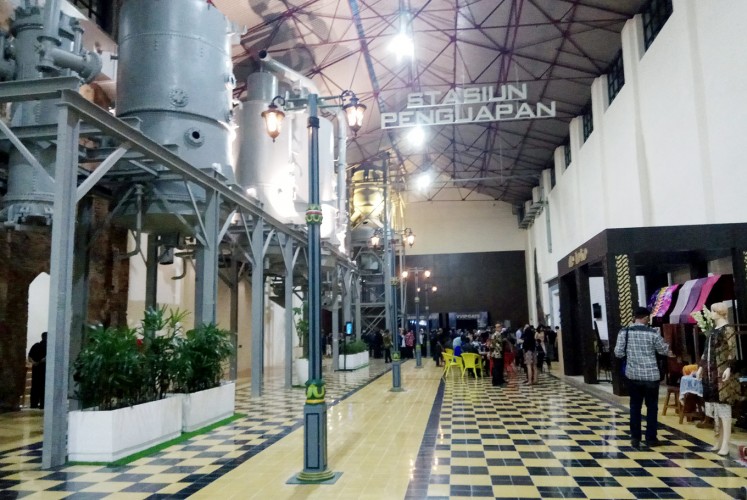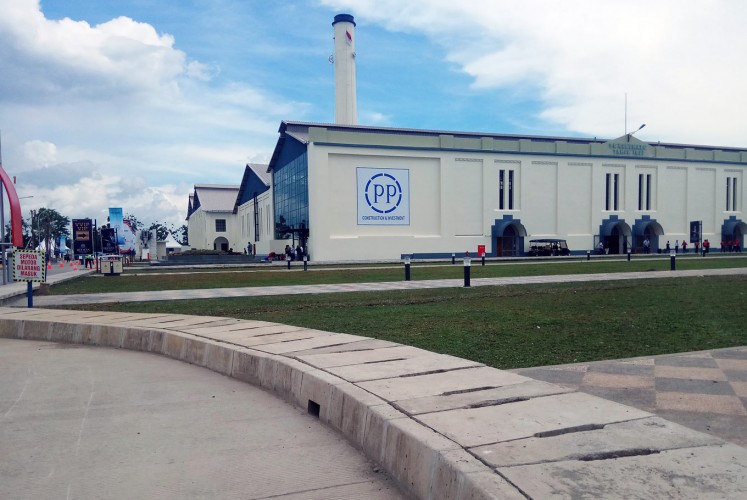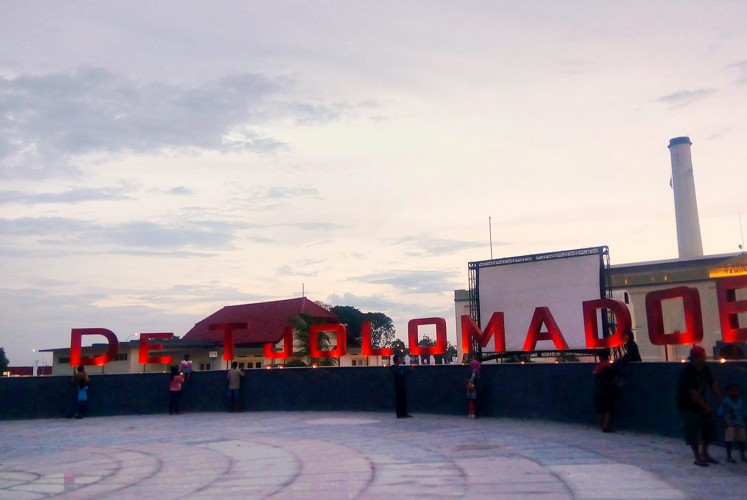Popular Reads
Top Results
Can't find what you're looking for?
View all search resultsPopular Reads
Top Results
Can't find what you're looking for?
View all search resultsDe Tjolomadoe the new destination of art and culture
This former sugar mill has been transformed into a new tourist site that is expected to draw more visitors to Surakarta.
Change text size
Gift Premium Articles
to Anyone
L
ocated in Colomadu, Karanganyar regency in Central Java, the opening of De Tjolomadoe was marked in style with the concert Hitman: David Foster and Friends.
After you touch down at Adi Soemarmo International Airport, on your way to downtown Surakarta, you will pass this beautiful and grand colonial building on your right side. The complex is so huge that it is nearly impossible to miss.
The 1.3-hectare building that sits on a plot of 6.4 ha looks solid and still maintains its past historic assets. The plant’s machinery, chimney and sugarcane conveyor tracks can be viewed in its main room, while some of its stripped walls have been left unrepaired to preserve the atmosphere of a bygone time.
The different areas of the building have retained the names used during the period of De Tjolomadoe. These areas include: Stasiun Gilingan (milling station) now functioning as a museum, Stasiun Ketelan (kettle station) now a café area, Stasiun Penguapan (vaporizing station) now an arcade and Stasiun Karbonatasi (carbonation station) now an arts and crafts area. The other three are Besali Café, Tjolomadoe Hall (concert hall) and Sarkara Hall.
Stasiun Gilingan has become a favorite room to visit. It was where the sugarcane was processed after being unloaded from trucks and taken to milling machines. Visitors can take selfies against the background of huge equipment.
“We’re opening networks with other parties such as the Indonesian Tours and Travel Agencies Association [Asita] and the Tourism Office to organize various tourist events here,” said Edison Suardi, the Construction General Manager of PT Sinergi Colomadu.
De Tjolomadoe also has vast outdoor areas in front of the building for its parking space, park and show arena with a capacity of 6,000 people and hundreds of vehicles. Edison said De Tolomadoe was designed to be a new tourist destination and center of art and culture in Surakarta. Later, this former sugar mill is also expected to attract tourists from Yogyakarta, Borobudur and Prambanan Temples and Semarang.
“De Tolomadoe will also favorably affect other related sectors. Culinary centers, hotels and tourist destinations in Surakarta will have a lot more visitors,” Edison pointed out.
However, according to Edison, in order to become a magnet for future tourists, De Tjolomadoe needed to prepare attractive events to complement the exoticism of the one-time sugar plant.
“In the near future De Tjolomadoe will hold many events such as exhibitions, musical shows, as well as traditional and modern dance. The recent success of David Foster’s concert makes us optimistic,” he said. In fact, at least 3,000 tickets were sold two weeks before the concert in the third week of March.
Foster, along with world-class vocalists Brian McKnight, Anggun C. Sasmi, Sandi Sandoro, Dira Sugandi and Yura Yunita fascinated the audience in the 2.5-hour performance.
“The public was all too eager to watch the David Foster show. People came not only from Solo [Surakarta] but also Surabaya, Semarang and even Jakarta,” said concert promoter Anas Syahirul Alimi.
Entry point: The front view of De Tjolomadoe in Colomadu, Karanganyar, Central Java, which has now become a cultural center and tourist destination, after previously operating as a sugar factory. (JP/Ganug Nugroho Adi)Before the David Foster concert, a number of events took place at De Tjolomadoe in 2017 such as the Scout Festival in January, a coloring contest in May, Ramadan festivities in May-June, zumba dance in September and various sketch competitions, photography, a batik fashion show and musical entertainment in December.
This year in March, a series of events was held to introduce the former sugar mill, such as a discussion on De Tjolomadoe as a cultural legacy, the Solo Batik Carnival and art exhibitions.
“In addition to art, heritage and tourism we hope this zone will also promote the region’s economic productivity,” said S. Linda Gustina, the Commercial Director of PT PP Properti Tbk, which belongs to a consortium of state enterprises.
Reborn: A defunct sugar factory, PG Colomadoe has been revitalized and rebranded as De Tjolomadoe in Colomadu, Karanganyar, Central Java. (JP/Ganug Nugroho Adi)De Tjolomadoe was formerly called the Colomadu Sugar Mill (PG Colomadu). It was built in 1861 by the local ruler, Mangkunegara IV (1853-1881). During its heyday, PG Colomadu was capable of exporting sugar to Holland, Singapore and Bandaneira. The proceeds from its sugar sales enabled Mangkunegara IV to set up primary schools, build roads and irrigation channels.
After Indonesia gained independence, PG Colomadu was taken over by the government in 1946. But the plant continued to produce sugar and its management was transferred to the Indonesian Estate Corporation (PPRI).
In 1981, PG Colomadu was managed by the State Estate Company (PNP) and in 1996 it was subordinated by the Indonesian State Estate Company (PTPN) IX. PG Colomadu ceased production on May 1, 1998 due to a shortage of raw materials and neglect of the building, which was finally revitalized in early 2017.
The revitalization of De Tjolomadoe involved four state enterprises — PT PP (Persero) Tbk, PT PP Properti Tbk, PT Taman Wisata Candi Prambanan, Borobudur dan Ratu Boko (Persero) and PT Jasa Marga Properti — which formed a consortium called PT Sinergi Colomadu.










